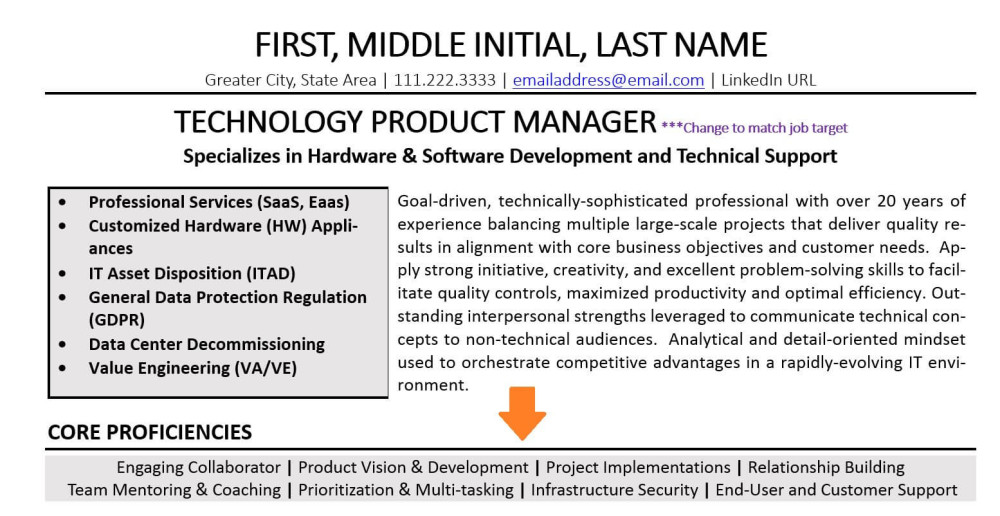Why a Targeted Resume is Your Key to Success - Customize Now!

Increase your chances of landing an interview with a targeted resume!
Far too many job seekers continue to use the same resume for every job application. While this sounds like a great idea in principle, it can prove disastrous in practice.
Generic resumes may do an effective job of highlighting your general skills and experience, but they’re less effective at selling you as the ideal fit for a particular job. Instead, you need a resume that specifically targets your desired job. In this post, we highlight what’s key for a targeted resume to help.
What is a targeted resume?
The goal of a targeted resume is to show the recruiters and hiring managers that you have the specific qualifications they’re seeking. A targeted resume is built around the job description related to each application you submit. Instead of providing a general overview of your career, a targeted resume is highly relevant, specific, and customized for the job you're applying to, which increases your chances of grabbing the attention of a hiring manager and landing an interview.
Why is a targeted resume important?
Generic resumes may have worked decades ago, but that’s no longer the case. Thanks to increased job competition and the use of applicant tracking systems (ATS), resumes need to be tailored to stand out.
Competitive job market
First, in a competitive labor market, employers can be more selective about who they hire. As a result, a candidate’s resume that lines up well with the open position they’re trying to fill is far more likely to grab the employer’s attention and land an interview than a general resume will.
In other words, if your resume is generic, chances are that it will be rejected. Instead, hiring managers will focus on your competition’s resumes – rivals who took the time to understand what’s key for a targeted resume to properly create one.
Applicant Tracking System (ATS)
Next, thanks to the use of applicant tracking systems, submitting a general resume can definitely hurt your chances of getting into the hands of a human reader, let alone landing an interview. Most companies use an ATS to automatically screen your resume to help them streamline and build efficiency into their hiring practices.
It’s an employer’s hope that an ATS will screen out the unqualified candidates, saving them time so they don’t have to review more resumes than necessary. Unfortunately, in addition to unqualified candidates, an ATS can also screen out qualified candidates if the candidate doesn’t have an ATS-friendly resume.
A high percentage of resumes are rejected by the ATS, and many times, it's because the resume isn't optimized to target the job they’re applying to.
Related reading: How to Get Your Resume Past the ATS Scans
Who should use a targeted resume?
Virtually any job candidate benefits from a targeted resume, including the following categories:
Entry-level candidates
College graduates
Experienced hires
Career changers
Part-time workers
Independent contractors
Freelancers
High school graduates
Regardless of your experience level, industry, or field of work, a targeted resume helps you get past an ATS and grab the attention of recruiters and hiring managers.
What’s key for a targeted resume?
Customization is key for a targeted resume. Through customization, you can create a highly-targeted resume that properly sells your value as an employee. You can tailor your qualifications and employment history to better align with the demands of any open position. Moreover, you can selectively present achievements that demonstrate your value.
These customization efforts can ensure that your resume has the right tone and detail to present you as the right candidate for the job.
Fortunately, you won’t need to create each resume from scratch. In fact, you should avoid that option – it takes way too long and doesn't necessarily increase your chances of getting an interview.
Instead, you should create one flexible resume that contains all the information you need to apply for any job in your field. You can then use that general resume as a template for any tailored resume you need.
Simply select the relevant details for your current resume version, and update the information as needed. That way, you don’t have to rewrite everything every time you apply for a job, saving you a lot of time, energy, and frustration.
Key tips for a targeted resume
Still, some changes will need to be made. You can minimize those changes and streamline the process by following these useful tips that are key for a targeted resume:
1. Carefully review the job description
The first key for a targeted resume is to closely review the job description. Highlight the key qualifications and skills required for the job, especially the ones you have that align with the employer’s requirements and preferences.
Also, make a note of any industry or employer-specific terminology. The key qualifications, skills, and terminology you identify are the keywords that will guide how you update and target your resume.
2. Use keywords properly
Resume keywords are essential for any targeted resume. Not only will they ensure that your resume gets read by applicant tracking systems, but their inclusion will more effectively showcase you as a great job candidate. You need to optimize the resume with relevant keywords to ensure your resume gets through.
As noted above, job postings include keywords related to the position title, including the skills, experience, and credentials the employer requires. Industry and employer-specific terminology are also keywords often read by an ATS. Once you identify the right keywords, insert them throughout your resume where appropriate, as discussed in the next section.
Related reading: 99+ Essential Keywords and Phrases for Impactful Resumes
3. Focus on each resume section
A good generic resume usually only requires minor changes to properly create a targeted resume. With the job description and your keyword list in hand, it’s time to carefully tweak each section of your resume to align with the job description.
Resume headline
A strong resume headline can indicate you’re well-positioned for the open position. Your resume title or headline should match the job description title as much as possible, assuming it aligns with your experience and qualifications.
Related reading: 30+ Resume Headline Examples
Resume summary overview
Your summary should be a focal point to tailor your resume. Once you’ve reviewed the job posting, make changes to your summary to ensure that it properly addresses the qualifications and skills mentioned in that posting. If there are educational or certification requirements beyond a standard degree, you can include those in the summary as well.
Example of a resume summary:
Goal-driven, technically sophisticated professional with over 20 years of experience balancing multiple large-scale projects that deliver quality results in alignment with core business objectives and customer needs. Apply strong initiative, creativity, and excellent problem-solving skills to facilitate quality controls, maximized productivity, and optimal efficiency. Outstanding interpersonal strengths leveraged to communicate technical concepts to non-technical audiences. Analytical and detail-oriented mindset used to orchestrate competitive advantages in a rapidly evolving IT environment.
Your summary is supposed to show why you're the perfect fit for this job in four to six lines. To tailor it, switch out keywords and target it as a response to the job posting. For more details, read “30 Resume Summary Examples that Work in 2024.”
Core competencies and skills list
A core competencies section on your resume is one of the best places to include and easily tailor keywords to whatever position you're applying for. Include 9 to 12 relevant hard and soft skills from the job description in your core competencies list.

Work experience qualifications
Include your qualifications that are applicable to the job description by highlighting your achievements or accomplishments that align with those qualifications. As you include your bulleted list of achievements, be sure to incorporate as much quantifiable data as possible to show your ability to succeed.
Related reading: How to Show Your Work Experience on Your Resume: Full Guide
Education and credentials
Include any required degrees that you have, as well as any required certifications and training in your Education section. Depending on the number of certifications you have, you can also include a separate Certifications section for them.
Related reading: 15 Free Certifications for Your Resume
Additional sections
If you find that you have experience or skills gaps when it comes to your direct work experience, consider other types of relevant experience you might have that covers those gaps.
For example, do you have volunteer experience or hobbies and interests that align with any of the job requirements or qualifications that you might be lacking? Including such experience can be a great way to increase the validity and relevance of your resume.
Related reading: Adding Volunteer Experience to Your Resume: A Sample Guide
4. Only include relevant details
Any content you include on your resume should be relevant to the job. That said, you should also search through your resume to identify the most relevant details that showcase your suitability for the position and remove anything that might take away from those highlights or cause your resume to spill over onto a second or third page, depending on your circumstances.
Again, you need to refer to the job posting. What is the employer looking for in a job candidate? Which specific skills and experiences does the company require?
When reviewing any job posting, remember that many include the most important requirements near the beginning of the post. Pay close attention to those requirements, and don’t be dismayed if you don’t meet every single one. Most candidates are unlikely to be a perfect match in that respect.
However, chances are that you have comparable skills or experiences that you can mention in your resume, which is another reason why tailoring your resume is critical.
Related reading: How Long Should a Resume Be in 2024?
Don't forget a targeted cover letter
Once you’ve created your tailored resume using what’s key for a targeted resume outlined above, the next step is to create a targeted cover letter to send along with it. You should do some research on the company and use that knowledge to create a cover letter that shows you’re a great fit for the job and the company’s culture. If you can accomplish that goal, you can dramatically increase your chances of landing an interview.
The targeted cover letter is, again, a response to the job you most want. If you can convey why you want this particular job at this time with this company, you'll be off to a good start. Follow through by explaining why you're the right fit for the company.
Related reading: What Does a Great Cover Letter Look Like in 2024?
Know what’s key for a targeted resume
With a targeted resume, you can get more out of your job application for your dream job. These tips and tricks about what’s key for a targeted resume will help you rise out of the stack of resumes and into the office for an interview, which is the goal of each application you submit. Good luck with your job search!
Are you wondering if your resume works well for the job you’re applying to? Does it take into account what’s key for a targeted resume? Why not submit it for a free resume review and find out?

